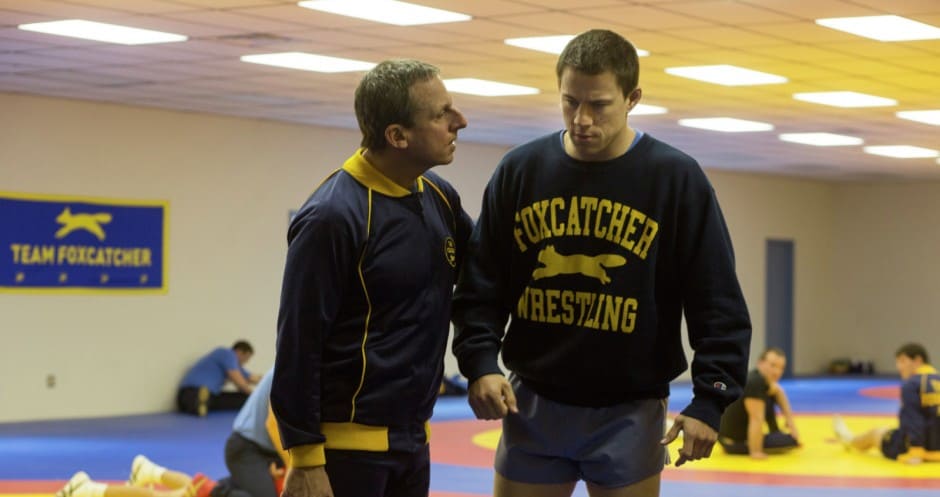Sports films can often find themselves descending into inedible treacle. The Blind Side, Miracle, Hoosiers, The Rookie, Jerry Maguire, or Field of Dreams — all sports movies held in moderately high regard, yet all sports movies that, at one point or another, find themselves bogged down by damp, tear-stained Kleenex. Making a good sports film that doesn’t rely upon cloying sentimentality is, in simplest terms, no small victory.
Enter Foxcatcher.
Based on a true story, Foxcatcher tells the tale of Olympic champions, and brothers, Mark Schultz (Channing Tatum) and David (Mark Ruffalo), who find the wrong benefactor in John du Pont (Steve Carell), a Pennsylvania multimillionaire and polymath. Du Pont, who comes from a wealthy American family, takes gold-medal winner Mark under his wing, bringing him out to live and train on the expansive property he shares with his formidable and condemning mother.
Driven by an overwhelming desire to “give America hope” and “bring honour and glory” to the nation in amateur sporting events, du Pont becomes a sponsor of USA wrestling, setting up training grounds for an unsurpassable American wrestling team on his Foxcatcher Farm. Meanwhile, as Mark drifts away from du Pont, who had become a sort of mentor to him, David grows closer to him, taking up residence on du Pont’s property and offering tutelage to Team Foxcatcher in preparation for the 1996 Summer Olympics.
The film’s script is astonishingly lean and punchy, sparse with dialogue but dense with triangular conflict and pathos. Foxcatcher provides unflinching portraits of its three leads, all of whom are rendered all the more rich by the talented — and uncharacteristic — actors playing them. Bennett Miller is deserving of resounding praise for his efforts, having managed to evoke stellar dramatic performances from Carell and Tatum, two performers far more acclimatized to the world of comedy or action, respectively. Hidden behind pounds of prosthetics and makeup, Carell is almost unrecognizable, and his creepily haunting portrayal of du Pont is quietly intimidating, yet utterly pitiable (and sure to attract Oscar attention).
Visually, Foxcatcher is bleakly beautiful, with muted, cold colours complimenting the quiet and contemplative nature of the film. Miller utilizes extreme long shots, artfully, deploying them frequently throughout the film, capturing and representing the characters’ distance from the world outside them. All the characters are trying to break away from something — du Pont from his family’s legacy and his mother’s disapproval, Mark from the shadow of his more respected older brother, and David from the damage left by his deadbeat parents — and shot composition plays a crucial role in metaphorically constructing this yearning for freedom.
At its core, Foxcatcher is about damaged, subordinated men, and their interwoven journeys toward redemption. Never grappling with oversentimentality, Foxcatcher is a blistering masterpiece with gripping performances, and is a shoe-in as a heavyweight Oscar contender.
Verdict: Not just for sports fans, Foxcatcher is one of the best films of the festival, and sure to attract Oscar buzz.


